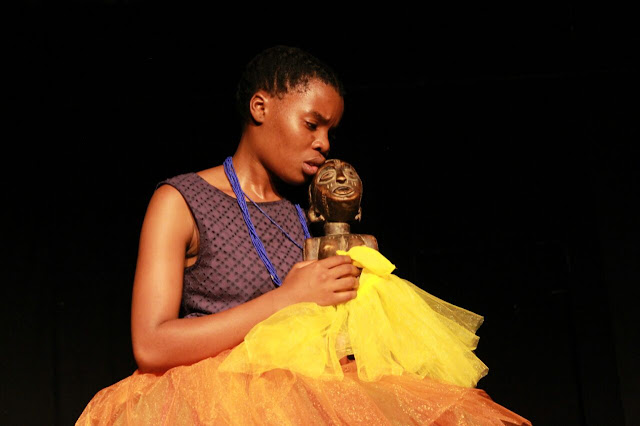KUKU stage-piece at Olive Tree Theatre, Wynberg in Alexandra Township
Olive Tree Theatre, a community based theatre development,
aimed at bridging a gap between the mainstream theatre and alternative spaces
located in Alexandra Township and focuses on developing and uplifting women and
the youth around the area. The OTT is hosting its 5th International
Women’s Theatre Festival 2016 under the artistic directorship of Ntshieng Mokgoro,
the 2008/9 Standard Bank Young Artist Award Winner for Theatre. Mokgoro is the
founder and creative director of Olive Tree Theatre. All the productions in
this festival are written, directed and performed by women from across the SADC
region. These include workshops and panel discussions spearheaded by women.
 |
| Nelago Gloria Shilongoh, Images Courtesy of Olive Tree Theatre, Photographer: Fikile Smynes |
African languages across all corners of the continent have
similarities one way or the other. Words may assonant the same way but mean
totally different thing in other languages. In the case of KUKU, a stage piece
written and performed by young Namibian theatre maker and performer, Nelago
Gloria Shilongoh, South African indigenous speakers were whirred with the title
for in their common understanding it meant something totally different both in
tone and spelling. KUKU - for grandmother in one of Namibian dialects, same of
Sepedi language meaning of KUKU, however, it is presaged ‘KOKO’.
KUKU is an expression interlaced with memories and lessons
learned with a further push into inquiries of a life upbringing under the
guidance and protection of a grandmother to a grandchild. With a pre-setup music
by the world’s greatest virtuoso on the kora, the sublime West African
instrument made from large gourd, cow skin and 21 strings, ToumaniDiabate, the
stage piece promised to be a captivating piece with the punctuation “Kuku
Wange…” from Shilongoh as she moves about
the floor to face her sculptural granny. Diabate’s music in this play, does not
only make spiritual connections between the audience and the soul of the stage
piece but it also shows not just music but its preservation of culture and
tradition, a way to keep alive the spirit of the defunct African Masks that
stretch across a vast swathe of African art, very art that inspired European
artists such as Pablo Picasso to mention a few.
 |
| Nelago Gloria Shilongoh, Images Courtesy of Olive Tree Theatre, Photographer: Fikile Smynes |
With a black sculpture facing away from her, five cloaks in
different colors on the floor with empty chair on the far left - memories and
places, visions and melodies find ways onto the stage. She sings in one of the
Namibian official languages – though an ear not tutored in any official languages
of this country cannot comprehend the message from the lyrics, one finds
enchantment in her melodies. There is a sovereignty of time, the autonomy of
place, the smell of intelligence and wisdom she exudes to the audience. KUKU
becomes a myriad burning fuse, each radiating its own fragility of explosive longings
and yearnings.
Shilongoh strikes a conversation with her sculptural granny,
a child and granny dialogue in a foreign language to the audience. Later she
switches to English-language, revealing furrow age of time that KUKU has lived.
Long before the continent’s history was recorded in books or on rocks, history
was told through a caste of griots, musical storytellers, sculptors and
painters. KUKU claims its rightful position at the 5th Women International
Theatre Festival as a memory and a link between society and the past, people and ancenstors.
Virtuosity is visible enough in this one-handler stage
piece. Shilongah emerges as a guardian of the ancient oral traditional history,
poetry and social etiquette and verbal dexterity of her family. She is a sort
of a narrator who believes her story can be traced all the way back to a common
ancestor, something which is visually practicable from her manipulation in the
use of the sculpted black female figure. “What is your name? Where do you come
from? Who do you think you are? Who are you?” she asks loaded questions, as if
the questions are directed to her common ancestor or her audience.
 |
| Nelago Gloria Shilongoh, Images Courtesy of Olive Tree Theatre, Photographer: Fikile Smynes |
There are stuttering answers to her loaded questions. It
feels as though that her mother, grandmother and great grandmother were talking
to her from the past. It is the past meeting the present for the future. The
purple beaded neck-piece is left of inheritance from Shilongoh’s KUKU
(grandmother) – it is then a metaphor for connection between the living and the
dead. As the play draws to an end, Shilongoh clefts in heavier confession “My
grandmother passed away few years later. I never went to her burial. I never
said good bye to her,” and she blew her flute in KUKU’s memory to seal her
confession.
The festival
officially opened on the 4th November and will conclude on the 13th
November 2016.
Khehla Chepape
Makgato is a Johannesburg-based independent artist and arts writer, regularly
contributing articles to ART AFRICA and The Journalist. He has his studio at Assemblage
Studios and is the founder of Samanthole Creative Projects & Workshop, a
community-based art organisation focusing on arts and literacy youth
programmes. Chepape is the ImpACT Award WINNER for Visual Arts 2016 from the
Arts and Culture Trust of South Africa.


Comments
Post a Comment